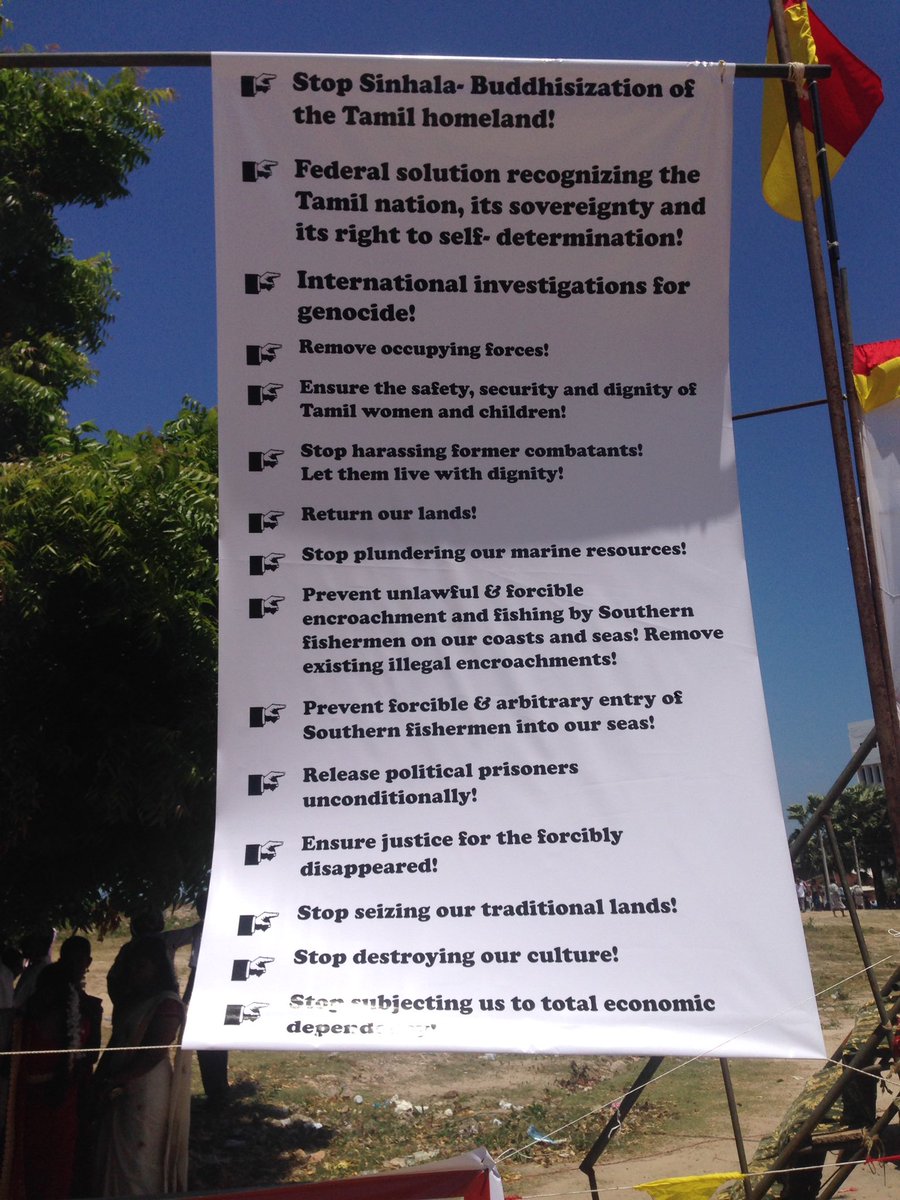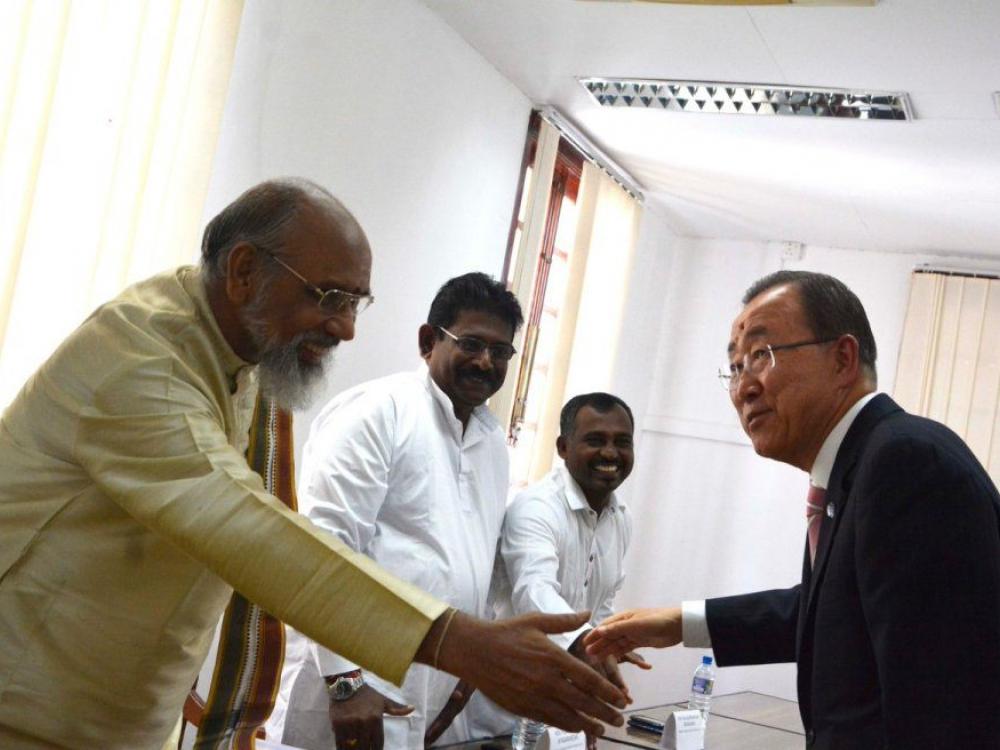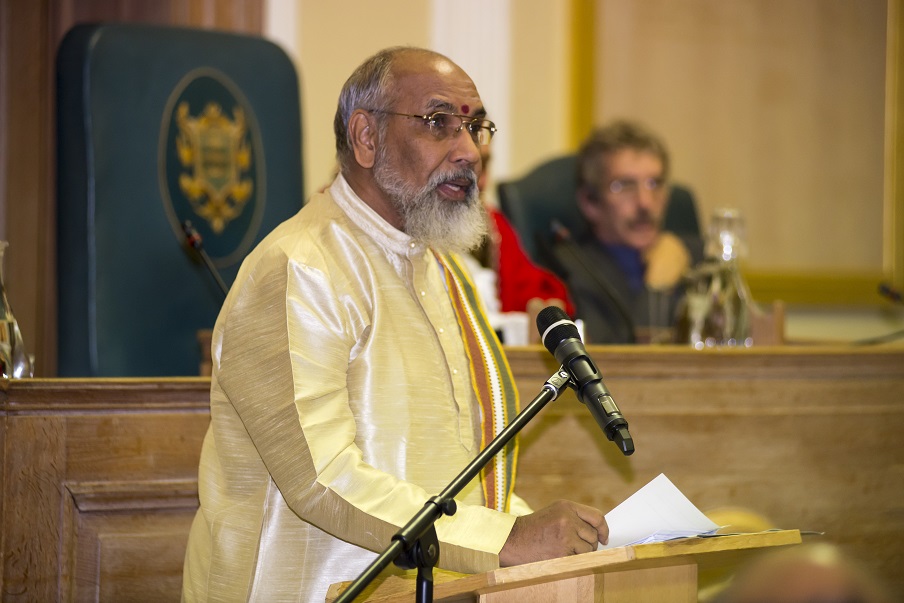Tamil Guardian interviewed the Chief Minister of the Northern Provincial Council C V Wigneswaran in London last week.
The twinning of the Royal Borough of Kingston in the United Kingdom with Jaffna in the Northern Province has opened up new avenues for the regeneration of the war torn North-East, as the region struggles to prosper following decades of armed conflict.
“This is the first time that we are entering into an agreement of this nature,” said the Chief Minister of the Northern Provincial Council C V Wigneswaran, in an interview with the Tamil Guardian in London last week. Outlining five key areas of the project – education, health, economic development, cultural affairs and governance support – the former supreme court judge said the initiative had the potential to spur development in a wide range of different sectors.

With talks underway for a new constitution for the island and accountability for human rights abuses due to be discussed at the UN Human Rights Council once more, the twinning project comes amidst years of struggle for a return to normalcy and uplifting the livelihoods of the Tamil people, since the armed conflict ended in May 2009.
However, in order to reap the full benefits of the project, a range of obstacles need to be overcome and Sri Lanka`s government must allow an opening up of the North-East, said the chief minister.
During his visit to inaugurate the twinning, he met with doctors at Kingston Hospital, British government officials and entrepreneurs from the UK. The potential benefits were vast, from assisting the Northern Provincial Council to govern with more transparency and accountability, to “working with the Foreign and Commonwealth Office in creating a vehicle for safe investment into the Jaffna district for expatriate Tamil communities in Kingston”. Even development of the co-operative sector in Jaffna has been earmarked by the chief minister. “This is something that has been neglected for a long period of time and it has got so much intervention or intrusion by the governmental sectors,” he said.
Partnering with the diaspora
Interfence by the Sri Lankan government has been blamed for holding back growth in the North-East, which continues to be plagued by a high level of poverty, increasing illicit drug use and has a continued massive Sri Lankan military presence.
“An inclusive society cannot be built with a counter-terrorism mind set,” Justice Wignewswaran told an audience in Kingston last week. And despite initial opposition to the twinning project, he hopes that such initiatives will help to convince the Sri Lankan state to intice investors to fund startups and build a new series of links across the region.In particular, he pointed again to the role the Tamil diaspora can play in helping to rejuvenate growth.
Much of the Tamil diaspora, spread across Western Europe, North America and many other parts of the world are thriving he noted, despite the fact that “they were forcibly got rid of from our country”. “There are still a lot of them having land there, their relations there and various connections that they have,” he said. “It is useful and natural that there should be greater collaboration between the two… In that respect we are trying to forge a greater collaborative effort on the part of the diaspora with us.”
 |
| Justice Wigneswaran speaking with members of the diaspora in the USA earlier this year. |
And it is that global Tamil diaspora that Justice Wigneswaran believes can play a crucial role in the future of the North-East, including those of the second and third generation.
“I would like closer collaboration with the diaspora,” he said. “Even if you are only English speaking or French speaking or whatever your background language may be, I would advise them to go back into their past and learn even in English, with regards to our language, our culture and our background. It is very essential and keeps us together. The golden thread that goes through all of us wherever we are is the cultural ambience, the cultural background from which we have come. That must be kept alive.”
However, he acknowledged the difficulties that lay ahead in forging closer ties with the diaspora. Many groups remain banned as `terrorist organisations` by the Sri Lankan government. Even under Sri Lanka`s current regime, Tamils returning to the island have been detained and deported by Sri Lankan authorities.
“The government of Sri Lanka must not look upon the diaspora as those who are only interested in separating the country, dividing the country and so on,” said the chief minister. Indeed, the inclusion of the diaspora can not only help the Tamil North-East, but could also provide some much needed assistance to Sri Lanka`s faltering economy. “The government of Sri Lanka must give us the chance to enrich the country as a whole while we are looking after our interests also,” he continued.
Hard discussions with the Sinhala south
The chief minister went on to echo this appeal to Sri Lankan leaders several times. “There may be a certain amount of suspicion amongst the Sinhala community,” he acknowledged, but added that it must be overcome to further stability across the island.
“It is high time that the leaders come together, sit down together and understand each other. That we are not in any way wanting to do anything harmful to the Sinhala community and the Sinhala community on its part should not unnecessarily be discriminating and be nasty to the Tamil community who have lived together for centuries in this country.”
Yet, Sri Lankan leaders have failed to deliver that message to the masses in the south continued an exasperated chief minister. Vehement opposition to Indian investment in the North-East was an example of that failure to communicate, he added.
“The Sinhala community I'm sure will understand if we are on our part really open and transparent on our relationship.” Sri Lankan political leaders however have not been actively relaying that across to the Sinhala people. Despite calls for an approach that demonstrates a genuine commitment to solving the island's ethnic conflict, Sri Lankan leaders “have not changed and they don't seem to be wanting to change for political reasons,” he added.
“You see there is a dichotomy in the whole thinking process in the academics among the Sinhalese,” he explained. “And also the politicians for their own personal benefit are making use of this to the detriment of the entire community.”
 Tamil leaders on their part must continue to reach out to the south and articulate Tamil aspirations too, he added. One example was the Ezhuga Tamil rally held last month, which drew thousands of peoples to the streets of Jaffna. Notably, banners at the demonstration had demands written in English, Tamil and Sinhala. Despite these attempts the Sinhala community seems to have misconstrued the march, opined the chief minister.
Tamil leaders on their part must continue to reach out to the south and articulate Tamil aspirations too, he added. One example was the Ezhuga Tamil rally held last month, which drew thousands of peoples to the streets of Jaffna. Notably, banners at the demonstration had demands written in English, Tamil and Sinhala. Despite these attempts the Sinhala community seems to have misconstrued the march, opined the chief minister.
“Ezhuga Tamil was never intended to be against the government, against the Sinhalese people, against the Buddhist monks or against even the army,” he said. “That was one of the first things I mentioned in my speech. We wanted the whole world and the Sinhala community and their leaders to know exactly what our concerns were.”
“But unfortunately the main mass of people have been fed with the wrong idea about the Tamil masses and with regards to the idea of federalism and as a result they have a completely distorted view of what we are asking, what we are saying, what we want, what our aspirations are,” he continued.
Recognising Tamil aspirations
As talks regarding a new constitution for the island are underway, the understanding of calls for federalism and self determination need to be better explained to the south, said Justice Wigneswaran. Stating that he had already submitted a list of recommendations to the Sri Lankan government, he spoke of how calls for a devolution of power should not be shied away from.
“In any federal unit, wherever people are entitled to self determination – internal self determination – these are powers that should be granted to them,” he said. “You can't have the centre coming and telling us “This should be done that should be done” and intruding into the way of life and administration of those areas... That is a right that should be granted and it is something that is accepted by an international covenant and agreements to which we are party. So therefore we are not asking for the moon. We are asking for something that is recognised by civilised nations. All over various countries. We have to take lessons from these countries and not having unnecessarily coming to conclusions that this will lead to separation and so on.”
In fact, it is the continued refusal to acknowledge Tamil aspirations that fuel calls for a separate state he continued. “Why should any of us want to separate if there is recognition of our background and our culture and our individuality and there is no discrimination against us?”
For the chief minister, the recognition of these core Tamil aspirations is key to bringing about stability on the island.
“The fact that the North-East has been always, for almost 2000 years or more, have been Tamil speaking areas must be recognised by the government,” he said. The significant Muslim population in those areas too must have their voice heard he added.
“With regards to the administrative benefits that Muslims want out of a merged North-East, that's a matter for discussion between the Tamils and the Muslims,” he added, but said he was aware that “the Muslims probably would like to have more powers as far as the areas where they are resident is concerned”.
“So that should be granted to them,” he declared.
 |
| Muslim protestors urged Justice Wigneswaran to take action and resettle them in Jaffna earlier this year. |
Efforts such as state sponsored colonisation of those areas though has only reinforced scepticism of the Sri Lankan government's commitment to building a future that will meaningfully empower stakeholders in the North-East.
“With all these things that are now taking place, the colonisation of the Northern province, with the help of the army and the building of Buddhist statues and Buddhist areas of worship in areas that are 99% or 100% non-Buddhist, these are things that will go on in order to somehow change the demography of the area.”
The building of these Buddhist places of worship across the Tamil-speaking regions has been extensive and accelerated since the end of the war. Despite repeated calls for a halt in construction, and even cases where court orders have been issued, new Buddhist sites continue to spring up undeterred.
“Why are they putting up Buddhist places of worship and constructing Buddhist statues with the help of the army on private lands,” questioned Justice Wigneswaran. “What does it mean? What are you wanting to achieve by this? This is quite an action that is against the law. So we are asking questions with regards to what is at the back of the mind of these people who are doing it.”
The path towards accountability
 |
| C V Wigneswaran told the UN Secretary General, Ban Ki Moon who visited Jaffna in September,that the Tamil people would not be satisfied regarding unless international judges and prosecutors were included in a war crimes enquiry.. |
Colombo's sincerity in solving the issues that continue to heighten ethnic tensions on the island have been questioned in other areas too. Though Sri Lankan co-sponsored a resolution at the UN Human Rights Council agreeing to include international judges and lawyers in an accountability mechanism, various leaders have repeatedly backtracked from that position. The Sri Lankan president has stated several times in public that he will not allow any foreign participation in an accountability mechanism.
“There is a lack of will,” mused Justice Wigneswaran. “Even though there has been a consensus resolution, the government is only acting in a way in which it has been acting in the past.”
History has shown the government has not been committal in prosecuting human rights abusers he noted. “That is how all Sinhalese governments have been acting in the past... they have not learnt from the past and they just want to go back to the same old way of thinking.”
Yet Sri Lanka cannot afford to let accountability for human rights abuses go unpunished, more than 7 years since the armed conflict ended. “Accountability is one of the most important things in this transition from the war time to a more democratic modern future of our country,” stated Justice Wigneswaran. “Because without a war enquiry and justice being brought to the people, it is not going to be helpful in trying to create reconciliation amongst the two communities... there are things that need to be done.”
The role of the international community in bringing about that reconciliation will be key he pointed. The lack of progress by Sri Lanka on the accountability front is something that he and other leaders have continued to raise. “Of course what they [Colombo] think is that the world community will turn a blind eye once geopolitical benefits are received by certain countries,” he stated. “That is a matter that we are bringing to the notice of the countries concerned.”
With Tamil demonstrations demanding accountability growing in numbers, the frustration on the ground at Sri Lanka's failures is palpable. The international community must step up on its obligations said Justice Wigneswaran. “The very same people who all together joined up and brought this consensus resolution - they owe it to us to see that something beneficial for us is done.”
“The international community on their part must see to it that they strictly see that the consensus resolution is implemented.”
It is with persistent engagement from the international community that the chief minister believes Colombo can be coaxed into progressing on those key issues – a point that he has raised to international delegations that have visited Jaffna.
“I would like to see that there must be a change of mindset on the parts of the government of Sri Lanka in order to accommodate all that they said they would in the consensus resolution,” he said. “And though there is very little progress that is being seen for various political reasons, they must be able to go beyond those restrictions in the political field as far as they are concerned and try their best to see to it that they conform.”
Whether it is the recently launched twinning project or moves towards accountability, seeing the island move towards reform and stability will require Sri Lankan leaders being pushed towards making bold moves with Sinhala communities, he concluded. “I think we have to bring about radical change with regards to this in order to go the the Sinhalese masses... Those who can do that are very very few.”
We need your support
Sri Lanka is one of the most dangerous places in the world to be a journalist. Tamil journalists are particularly at threat, with at least 41 media workers known to have been killed by the Sri Lankan state or its paramilitaries during and after the armed conflict.
Despite the risks, our team on the ground remain committed to providing detailed and accurate reporting of developments in the Tamil homeland, across the island and around the world, as well as providing expert analysis and insight from the Tamil point of view
We need your support in keeping our journalism going. Support our work today.
For more ways to donate visit https://donate.tamilguardian.com.


